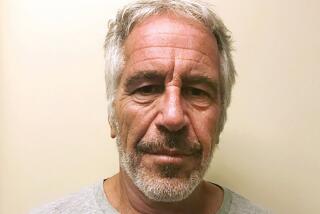Victim of S&L; Loss Kills Self : Suicide: A retiree saw his $200,000 life savings evaporate in Lincoln Savings & Loan collapse. He wrote, ‘There is nothing left for me. . . .’
- Share via
An elderly Burbank man who was distraught over losing $200,000--his life savings--in the Lincoln Savings & Loan collapse killed himself, leaving behind a suicide note that blamed the crisis and the federal government for his woes, police said Wednesday.
“There is nothing left for me of things that used to be,” Anthony Elliott, 89, said in a typewritten note dated Thanksgiving Day. “My government is supposed to serve and protect, but who? Those who can gather the most savings from retired people. . . . It takes billions to fill the pockets of spendocrats. I’ve had enough of this waring (sic) world.”
Elliott was found dead Monday in his home in the 900 block of California Street. The widower, who was a retired accountant, had slit his wrists with a straight razor while in a bathtub. Police believe he killed himself Sunday, three days after typing out the suicide note.
Though Elliott was in poor health, investigators attributed his suicide to his loss of about $200,000 he had invested in bonds through the Irvine-based Lincoln Savings & Loan.
“It’s our opinion that his death is directly attributable to his loss in the Lincoln Savings & Loan crisis,” Burbank Police Sgt. Don Goldberg said. “According to neighbors and friends, he became very cynical, very bitter. He had lost his life savings.”
Elliott lost his investment when Lincoln’s parent company, American Continental Corp., filed for bankruptcy in April, 1989. As many as 17,000 other investors, mostly over the age of 60, lost an estimated $200 million invested in bonds.
Federal regulators seized control of Lincoln after the collapse. Charles H. Keating Jr., former chairman of the Phoenix-based ACC, and three others were indicted for fraud and have pleaded not guilty. Keating is free on $300,000 bail.
Other victims who lost money when Lincoln collapsed called Elliott’s suicide tragic, but not surprising.
“It is very devastating to us. We are angry about it,” said Jeri Mellon, chairwoman of Lincoln ACC Bondholders Action Committee, a support group of about 400 investors who lost money.
“Anger will keep you alive. Mr. Elliott must have lost his anger. There are others out there who feel this way.”
Deputy Dist. Atty. Terry Bork said Elliott was not one of the victims involved in the 46 counts of fraud against Keating.
Stephen C. Neal, an attorney representing Keating, said his client feels remorse over Elliott’s death but maintains that he will eventually be cleared of any wrongdoing and responsibility for the losses of investors.
“Neither Mr. Keating, or anyone else, could feel anything but remorse, regardless of what motivated (the suicide),” Neal said. “Nobody likes to see someone in that situation.
“We obviously believe that Mr. Keating . . . is not responsible for the plight of any ACC bond holders,” Neal added.
Joseph Cotchett, a Burlingame attorney who represented Elliott as one of 17,000 people in a class-action suit against Lincoln, said Elliott was like most other victims in that he had been forced to live on Social Security after losing everything. However, the average loss to investors was about $25,000, far less than what Elliott lost, he said.
“He was far on the top end,” Cotchett said. “This represented everything to him. He lived on Social Security after Lincoln went under. Charlie Keating ate better in L.A. County Jail than most (of the Lincoln investors) do. He got three meals a day.”
Cotchett said Elliott had been one of the most active of the victims involved in the lawsuit. He said Elliott often called the attorney’s office to check on the status of the case, attended meetings with the support group and court hearings on the case.
“It’s just a tragedy,” Cotchett said. But he added, “It doesn’t surprise me at all. It was done out of total frustration.”
More to Read
Inside the business of entertainment
The Wide Shot brings you news, analysis and insights on everything from streaming wars to production — and what it all means for the future.
You may occasionally receive promotional content from the Los Angeles Times.










